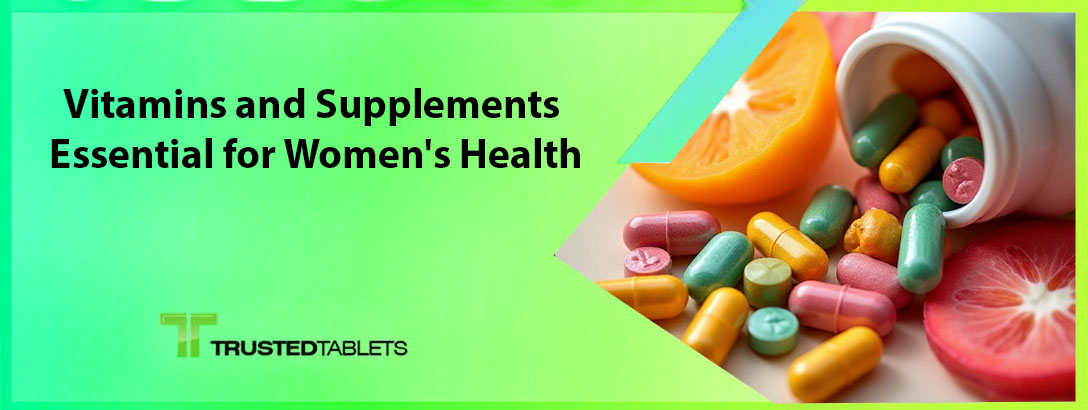In today’s fast-paced world, maintaining optimal health is paramount, especially for women who juggle numerous responsibilities. To support their unique physiological needs, incorporating the right vitamins and supplements is crucial. This comprehensive guide explores essential vitamins and supplements that can significantly enhance women’s health, addressing specific needs related to hormonal balance, bone health, reproductive health, and overall wellness.
Understanding Women’s Nutritional Needs
Women experience various life stages that impact their nutritional requirements. From puberty to menopause, hormonal fluctuations can lead to specific deficiencies that must be addressed through proper nutrition and supplementation. A balanced diet rich in whole foods is ideal, but sometimes, it is necessary to augment it with vitamins and supplements to ensure adequate nutrient intake.
Key Vitamins and Supplements for Women’s Health
1. Vitamin D: The Sunshine Vitamin
Vitamin D plays a vital role in women’s health, especially concerning bone health and immune function. It aids in calcium absorption, which is essential for maintaining strong bones. Women are particularly susceptible to osteoporosis, especially post-menopause when estrogen levels decline.
- Sources: The body synthesizes Vitamin D through sunlight exposure, but it can also be obtained from fortified foods and supplements.
- Recommended Dosage: Women should aim for 600-800 IU per day, though some may require higher doses based on their health status and sun exposure.
2. Calcium: The Bone Builder
Calcium is another critical nutrient for women, particularly for those over 50. Adequate calcium intake is necessary to prevent bone loss and reduce the risk of fractures.
- Sources: Dairy products, leafy greens, and fortified plant-based milk are excellent sources.
- Recommended Dosage: Women should consume about 1,000 mg per day, increasing to 1,200 mg for women over 50.
3. Iron: The Energy Booster
Iron is essential for women, particularly during menstruation, pregnancy, and postpartum recovery. Insufficient iron levels can lead to anemia, characterized by fatigue and weakness.
- Sources: Red meat, poultry, fish, beans, and fortified cereals are good sources of iron. It’s crucial to pair iron-rich foods with Vitamin C to enhance absorption.
- Recommended Dosage: Women aged 19-50 should aim for 18 mg of iron daily, while pregnant women require 27 mg.
4. Folate: The Essential B Vitamin
Folate, or Vitamin B9, is crucial for women, especially during the reproductive years and pregnancy. It supports fetal development and helps prevent neural tube defects.
- Sources: Leafy greens, legumes, nuts, and fortified grains are excellent sources of folate.
- Recommended Dosage: Women should consume at least 400 mcg daily, increasing to 600 mcg during pregnancy.
5. Omega-3 Fatty Acids: The Heart Health Heroes
Omega-3 fatty acids are essential for cardiovascular health and cognitive function. They can help reduce inflammation, lower the risk of heart disease, and improve mood.
- Sources: Fatty fish (such as salmon and sardines), flaxseeds, and walnuts are rich in omega-3s. Supplements like fish oil or algae-based omega-3s are also effective.
- Recommended Dosage: Aim for at least 250-500 mg of combined EPA and DHA (types of omega-3s) per day.
6. Probiotics: The Gut Health Guardians
Probiotics support digestive health and bolster the immune system by maintaining a healthy gut microbiome. They are particularly beneficial for women, who often experience digestive issues related to hormonal changes.
- Sources: Yogurt, kefir, sauerkraut, and other fermented foods contain natural probiotics. Supplements can also provide specific strains for targeted health benefits.
- Recommended Dosage: Aim for a probiotic supplement with at least 1 billion CFUs (colony-forming units) daily.
7. Magnesium: The Stress Reliever
Magnesium is essential for numerous biochemical processes, including energy production, muscle function, and the regulation of mood. It can help alleviate symptoms of premenstrual syndrome (PMS) and promote better sleep.
- Sources: Nuts, seeds, whole grains, and leafy greens are rich in magnesium.
- Recommended Dosage: Women should aim for about 310-320 mg per day.
8. Coenzyme Q10: The Energy Enhancer
Coenzyme Q10 (CoQ10) is a powerful antioxidant that helps with energy production in cells. It may support heart health and improve energy levels, especially in older women.
- Sources: CoQ10 is found in small amounts in meats, fish, and whole grains, but supplementation is often necessary to achieve therapeutic levels.
- Recommended Dosage: A typical dosage ranges from 100 to 200 mg per day.
9. Vitamin B12: The Neurological Supporter
Vitamin B12 is crucial for maintaining nerve health and producing red blood cells. Deficiency can lead to fatigue and neurological issues, particularly in older women or those following a vegetarian or vegan diet.
- Sources: Animal products like meat, fish, dairy, and fortified cereals are primary sources of B12.
- Recommended Dosage: Women should aim for 2.4 mcg per day, with higher amounts during pregnancy and breastfeeding.
10. Multivitamins: A Convenient Option
For many women, a daily multivitamin can be an excellent way to fill nutritional gaps. A good quality multivitamin should contain essential vitamins and minerals tailored to women’s health needs.
- Sources: Available in various forms, including tablets, gummies, and powders.
- Recommended Dosage: Follow the label’s instructions, ensuring it aligns with individual health requirements.
Conclusion: Empowering Women’s Health Through Nutrition
Incorporating essential vitamins and supplements into a woman’s daily routine can significantly impact her overall health and well-being. It’s essential to consult with a healthcare professional before starting any new supplement regimen, as individual needs may vary. By prioritizing nutrition and understanding the specific vitamins and supplements that support women’s health, we can empower women to lead healthier, more vibrant lives.


